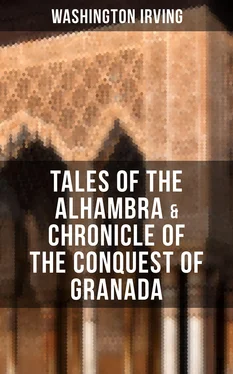The prince was overjoyed to find the owl so deeply versed in topography, and now informed him, in confidence, of his tender passion and his intended elopement, urging him to be his companion and counsellor.
“Go to!” said the owl, with a look of displeasure; “am I a bird to engage in a love affair? I whose whole time is devoted to meditation and the moon?”
“Be not offended, most solemn owl,” replied the prince; “abstract thyself for a time from meditation and the moon, and aid me in my flight, and thou shalt have whatever heart can wish.”
“I have that already,” said the owl: “a few mice are sufficient for my frugal table, and this hole in the wall is spacious enough for my studies; and what more does a philosopher like myself desire?”
“Bethink thee, most wise owl, that while moping in thy cell and gazing at the moon, all thy talents are lost to the world. I shall one day be a sovereign prince, and may advance thee to some post of honor and dignity.”
The owl, though a philosopher and above the ordinary wants of life, was not above ambition; so he was finally prevailed on to elope with the prince, and be his guide and mentor in his pilgrimage.
The plans of a lover are promptly executed. The prince collected all his jewels, and concealed them about his person as travelling funds. That very night he lowered himself by his scarf from a balcony of the tower, clambered over the outer walls of the Generalife, and, guided by the owl, made good his escape before morning to the mountains.
He now held a council with his mentor as to his future course.
“Might I advise,” said the owl, “I would recommend you to repair to Seville. You must know that many years since I was on a visit to an uncle, an owl of great dignity and power, who lived in a ruined wing of the Alcazar of that place. In my hoverings at night over the city I frequently remarked a light burning in a lonely tower. At length I alighted on the battlements, and found it to proceed from the lamp of an Arabian magician: he was surrounded by his magic books, and on his shoulder was perched his familiar, an ancient raven who had come with him from Egypt. I am acquainted with that raven, and owe to him a great part of the knowledge I possess. The magician is since dead, but the raven still inhabits the tower, for these birds are of wonderful long life. I would advise you, O prince, to seek that raven, for he is a soothsayer and a conjurer, and deals in the black art, for which all ravens, and especially those of Egypt, are renowned.”
The prince was struck with the wisdom of this advice, and accordingly bent his course towards Seville. He travelled only in the night, to accommodate his companion, and lay by during the day in some dark cavern or mouldering watchtower, for the owl knew every hiding hole of the kind, and had a most antiquarian taste for ruins.
At length one morning at daybreak they reached the city of Seville, where the owl, who hated the glare and bustle of crowded streets, halted without the gate, and took up his quarters in a hollow tree.
The prince entered the gate, and readily found the magic tower, which rose above the houses of the city, as a palm-tree rises above the shrubs of the desert; it was in fact the same tower standing at the present day, and known as the Giralda, the famous Moorish tower of Seville.
The prince ascended by a great winding staircase to the summit of the tower, where he found the cabalistic raven, an old, mysterious, grayheaded bird, ragged in feather, with a film over one eye that gave him the glare of a spectre. He was perched on one leg, with his head turned on one side, poring with his remaining eye on a diagram described on the pavement.
The prince approached him with the awe and reverence naturally inspired by his venerable appearance and supernatural wisdom. “Pardon me, most ancient and darkly wise raven,” exclaimed he, “if for a moment I interrupt those studies which are the wonder of the world. You behold before you a votary of love, who would fain seek your counsel how to obtain the object of his passion.”
“In other words,” said the raven, with a significant look, “you seek to try my skill in palmistry. Come, show me your hand, and let me decipher the mysterious lines of fortune.”
“Excuse me,” said the prince, “I come not to pry into the decrees of fate, which are hidden by Allah from the eyes of mortals; I am a pilgrim of love, and seek but to find a clue to the object of my pilgrimage.”
“And can you be at any loss for an object in amorous Andalusia?” said the old raven, leering upon him with his single eye; “above all, can you be at a loss in wanton Seville, where black-eyed damsels dance the zambra under every orange grove?”
The prince blushed, and was somewhat shocked at hearing an old bird with one foot in the grave talk thus loosely. “Believe me,” said he, gravely, “I am on none such light and vagrant errand as thou dost insinuate. The black-eyed damsels of Andalusia who dance among the orange groves of the Guadalquivir are as naught to me. I seek one unknown but immaculate beauty, the original of this picture; and I beseech thee, most potent raven, if it be within the scope of thy knowledge or the reach of thy art, inform me where she may be found.”
The grayheaded raven was rebuked by the gravity of the prince.
“What know I,” replied he, dryly, “of youth and beauty? my visits are to the old and withered, not the fresh and fair: the harbinger of fate am I; who croak bodings of death from the chimney top, and flap my wings at the sick man’s window. You must seek elsewhere for tidings of your unknown beauty.”
“And where can I seek if not among the sons of wisdom, versed in the book of destiny? Know that I am a royal prince, fated by the stars, and sent on a mysterious enterprise on which may hang the destiny of empires.”
When the raven heard that it was a matter of vast moment, in which the stars took interest, he changed his tone and manner, and listened with profound attention to the story of the prince. When it was concluded, he replied, “Touching this princess, I can give thee no information of myself, for my flight is not among gardens, or around ladies’ bowers; but hie thee to Cordova, seek the palm-tree of the great Abderahman, which stands in the court of the principal mosque: at the foot of it thou wilt find a great traveller who has visited all countries and courts, and been a favorite with queens and princesses. He will give thee tidings of the object of thy search.”
“Many thanks for this precious information,” said the prince. “Farewell, most venerable conjurer.”
“Farewell, pilgrim of love,” said the raven, dryly, and again fell to pondering on the diagram.
The prince sallied forth from Seville, sought his fellow-traveller the owl, who was still dozing in the hollow tree, and set off for Cordova.
He approached it along hanging gardens, and orange and citron groves, overlooking the fair valley of the Guadalquivir. When arrived at its gates the owl flew up to a dark hole in the wall, and the prince proceeded in quest of the palm-tree planted in days of yore by the great Abderahman. It stood in the midst of the great court of the mosque, towering from amidst orange and cypress trees. Dervises and Faquirs were seated in groups under the cloisters of the court, and many of the faithful were performing their ablutions at the fountains before entering the mosque.
At the foot of the palm-tree was a crowd listening to the words of one who appeared to be talking with great volubility. “This,” said the prince to himself, “must be the great traveller who is to give me tidings of the unknown princess.” He mingled in the crowd, but was astonished to perceive that they were all listening to a parrot, who with his bright green coat, pragmatical eye, and consequential topknot, had the air of a bird on excellent terms with himself.
Читать дальше












